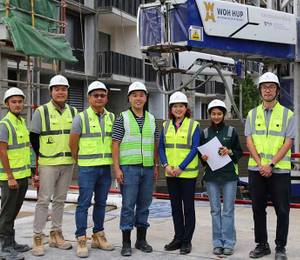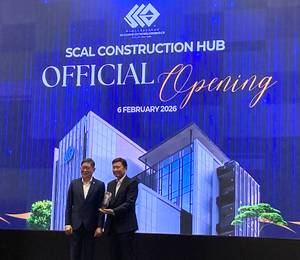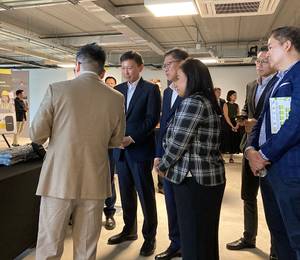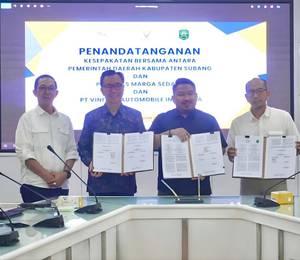Singapore’s Minister for National Development and Minister-in-charge of Social Services Integration, Desmond Lee, recently unveiled a S$100 million Built Environment Technology and Capability (BETC) grant to support the industry in the next phase of transformation, with outcomes aligned with the Built Environment (BE) Industry Transformation Map (ITM). This grant will support BE firms in developing new capabilities in enterprise, technology and manpower, enhancing their competitiveness in an evolving industry landscape. More details can be found here.
According to the Building and Construction Authority (BCA), Singapore’s BE sector has made significant strides in key BE ITM transformation areas between 2023 and 2024 – integrated digital delivery (IDD) adoption in new developments rose from 58% to 67%, while design for manufacturing and assembly (DfMA) uptake increased from 61% to 68%.
Good progress has also been made for the Singapore Green Building Masterplan ‘80-80-80’ targets, added BCA. As of December 2024, about 61% of buildings by gross floor area (GFA) were greened; close to 26% of new developments were certified as Super Low Energy (SLE) buildings, and top-performing buildings showed 72% better energy efficiency compared to 2005 levels.
BETC grant
The BETC grant incentivises BE firms to embark on their next bound of transformation and capability building to achieve higher productivity, a higher-skilled workforce and stronger collaboration. Applicants will need to demonstrate how they plan to apply the new capabilities that they aim to develop, not just for a standalone project, but also for their subsequent projects. They will also need to outline how this would be aligned to their company’s longer-term goals. The capabilities and transformation outcomes should surpass relevant industry standards. This is to enable more impactful and sustained transformation within the firms, and in turn, in the sector.
The BETC grant will be available for applications via the Business Grants Portal (BGP) from 1 April 2025, for a period of five years. BE firms, including developers, main builders, sub-contractors, consultants, prefabricators, and suppliers can apply. Small and medium-sized enterprises (SMEs) may receive up to 70% funding support, while non-SMEs may receive up to 50% funding support in the first two years. The funding support will be determined based on the expected transformation outcomes committed by the applicant.
Improving business sustainability
Second Minister for Finance and Second Minister for National Development, Indranee Rajah, has also provided an update on the Taskforce for Architectural and Engineering Consultant’s initiatives. Set up in September 2024, the taskforce brings together industry and government bodies to co-create solutions to common challenges. It has engaged close to 200 stakeholders to solicit feedback and suggestions. These stakeholders include students, young professionals, and representatives from consultancy firms, service buyers, trade associations and institutes of higher learning (IHLs).
The taskforce recognises the industry’s concerns on how aggressive tender bidding behaviours and fee-diving could undermine firms’ ability to invest in human capital, technology and innovation.
As a major buyer of BE consultancy services, the government has been progressively enhancing its procurement approach to deter fee-diving and strengthen quality-based procurement. Today, the majority of public sector tenders are awarded to bids with top quality scores.
To further promote fairer and more quality-based procurement and give the industry greater assurance to invest more in human capital and innovation, the government will:
-
Expand the ‘Reduced Fee Score’ pilot, which was first introduced in March 2024, to more projects. This system disqualifies outlier bids that are substantially lower than other bids in the same tender, thus ensuring that procurement decisions prioritise quality and business sustainability even more, rather than awarding projects to unsustainable low bids that may compromise the eventual outcomes.
-
Review contractual clauses to ensure fairer balance of risks between public sector service buyers and BE consultants. This includes reviewing the ‘Limitation of Liability’ clause in the Public Sector Standard Consultancy Agreement, and the ‘Fit for Purpose’ clauses in the Public Sector Standard Conditions of Contract for Design & Build (D&B) construction contracts. Such a solution will provide greater assurance to firms, and make the professions more sustainable.
In addition, the taskforce is engaging the private developers to encourage adoption of similar procurement approaches.
Investing in talent pipeline
To support the career development and experience of in-service talents, the Singapore Institute of Architects (SIA), Association of Consulting Engineers Singapore (ACES) and Institute of Human Resource Professionals (IHRP) will form a new partnership to roll out HR transformation support for member firms. This partnership will progressively support firms identify areas for improvement using the Human Capital Diagnostic Tool (HCDT), build a community of practice to share best practices and address common issues, and refer firms to resources to transform HR practices within firms.
To help strengthen the talent pipeline and make BE professions a career of choice, the taskforce is working with industry stakeholders and IHLs to propagate more enriching internship experiences (e.g. the integrated work-study programme offered by Singapore Institute of Technology) and review the starting salaries for fresh graduates. Several progressive firms, like Arup Singapore, Beca, DP Architects and ID Architects have taken the lead in adopting these initiatives.
To help firms and professionals identify the transformation support that best meet their needs, BCA will launch a one-stop compilation of available support resources and programmes (including BETC) made available by government agencies, the trade associations and chambers (TACs), IHLs and other stakeholders. TACs can then guide their member firms and professional associations accordingly.
The taskforce is also looking at how the TACs can take on a leading role in catalysing transformation of member firms and uplifting the professions, such as in the areas of branding, outreach, HR practices and technology adoption.
Image: Jason Goh/Pixabay











